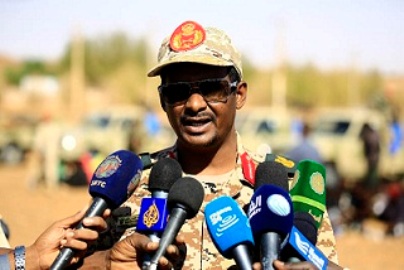RSF deploys large forces to support disarmament campaign in Darfur: commander
November 5, 2017 (KHARTOUM) – Commander of the Rapid Support Forces (RSF) Mohamed Hamdan Daglo, (aka Hametti) Sunday said his militia deployed “a very large number” of fighters to support the disarmament campaign in Darfur.

The higher committee for the collection of weapons and unregulated vehicles started the forcible phase of the campaign in all the states of Sudan on 15 October.
On 11 October, 10,000 RSF militiamen arrived in North Darfur to contribute to establishing security in the troubled state and support the mandatory phase of the disarmament campaign.
Also, on Friday morning, an additional RSF armoured regiment composed of tanks and armoured vehicles arrived in El-Fasher, North Darfur in a reinforcement of the weapons collection force.
“We have mobilized very large forces in Darfur and we will mobilize more forces to fight the outlaws,”, Hametti said told a press conference held in Khartoum on Sunday, pointing that the Sudanese army troops would soon be deployed to support the disarmament campaign.
He stressed the RSF wouldn’t allow civilians to hold illegal weapons, saying his fighters will be deployed across the region to collect the arms.
RSF commander added his fighters are currently working to combat illegal migration, human trafficking and narcotics after they managed to defeat the insurgency.
He disclosed that 20 vehicles loaded with drugs have entered the capital, Khartoum this week.
For his part, RSF spokesperson Abdel Rahman al-Jaali told reporters they captured two vehicles loaded with 189 quintals (19 tonnes) of Hashish.
The RSF militia was originally mobilised by the Sudanese government to quell the insurgency that broke out in Sudan’s western region of Darfur in 2003.
Earlier this year, the Sudanese parliament passed RSF Act which integrates the notorious militia in the Sudanese army and provides that its commander is appointed by the President of the Republic.
CONFRONTING MUSA HILAL MILITIA
Meanwhile, Hametti ruled out that the RSF would clash with the Border Guards Force (BGF) militia led by to the tribal chief Musa Hilal.
“No confrontation would occur between me and Musa Hilal, he is a [Sudanese] citizen and my cousin, and we are only targeting the outlaws,” said Hametti.
It is noteworthy that the BGF in Darfur’s five states has refused to cooperate with the disarmament campaign and also rejected a government demand to merge with the RSF.
The tribal leader announced his readiness to confront government forces militarily if they attempt to disarm his militia forcibly.
However, the government recently took a series of measures aiming to restrict his influence in the region starting by the control of the gold mines in North Darfur, and the dialogue with his supporters to join the government militia of the RSF.
Analysts believe that the government’s strategy of encirclement vis-à-vis Musa Hilal is becoming evident after depriving him of the resources of gold mines and ongoing efforts to isolate him from his supporters.
Musa Hilal was designated by the US State Department in 2004 as one of the top Janjaweed leaders running a terror campaign against civilians in Darfur. However, the security agencies gradually distanced their activities from the tribal leader who formed the BGF.
He was angered by the formation of the RSF because the government promoted Hametti who was one of his aides to command this new militia, a move that he considers as a direct threat to his tribal authority.
Hilal left the capital Khartoum in mid-2013 and retreated to his hometown of Misteriya in North Darfur along with his troops and continued blasting the government and the ruling National Congress Party.
In 2014, Hilal’s troops seized control of western localities in North Darfur state including Saraf Omra, Kutum, Kebkabiya, Al-Seraif, and El Waha.
The tribal chief announced the establishment of administrations in these localities, naming his forces Sudanese Revolutionary Awakening Council (SRAC).
(ST)
